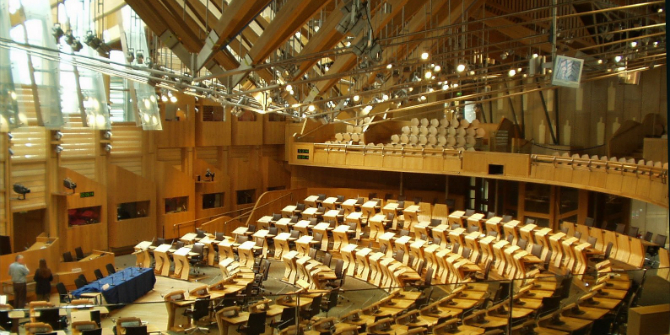 It is difficult to see how the government could legally justify a decision not to seek an extension of negotiations under Article 50, argues Philip Allott (Cambridge University), given that it would have to rely on political rather than legal considerations to avoid responsibility for the damage that could be caused by that failure.
It is difficult to see how the government could legally justify a decision not to seek an extension of negotiations under Article 50, argues Philip Allott (Cambridge University), given that it would have to rely on political rather than legal considerations to avoid responsibility for the damage that could be caused by that failure.
There are many people who honestly believe that the British people took a binding decision on 16 June 2016 to leave the EU. But no one can reasonably believe that, in so deciding, the British people chose to leave the EU on the particular date of 29 March 2019, or to leave without concluding an agreement with the EU, or to leave with an agreement that might lead to an unlimited period of serious uncertainty in the life of the UK, nationally and internationally, and might even threaten the unity of the United Kingdom.

Those three things are entirely the work of the government. They are a self-inflicted nightmare. Unusually, they are a nightmare from which we can escape by our own act. If the government does not decide before 29 March to withdraw the UK notification of its intention to leave the EU, it can instead seek to extend the period of negotiation of UK withdrawal under the explicit terms of Article 50 of the Treaty on European Union.
If the government fails to adopt that course of action, the question would arise as to whether it is arbitrarily failing to exercise a power under EU law, which is also a power under UK law, thereby risking major potential harm to the country.
Under the principle known as the Rule of Law, a fundamental principle of our constitutional system, the legality of the exercise of powers by public authorities is subject to review by the courts. There have been famous cases in which the courts have decided that a public authority had acted unlawfully in highly political matters.
In the Tameside case in 1976, the House of Lords decided that the Secretary of State for Education had acted unlawfully in relation to the introduction of comprehensive schools in Tameside. The department had failed to evaluate correctly facts required for a valid exercise of the power under the relevant legislation, and had taken into account facts that ought not to have been taken into account.
In the Bromley case in 1983, the Lords decided that the Greater London Council had acted unlawfully in giving effect to the reduction of fares on the London Underground under the ‘Fares Fair’ policy that had been included in the election manifesto of the Labour party, which had taken control of the GLC. The new fare system had been based partly on political considerations, not solely on economic factors as the relevant legislation required.
Those two decisions have been referred to in countless subsequent cases decided by the courts. It is difficult to see how the present government could justify on legally valid grounds a decision not to seek to extend the period of negotiation of UK withdrawal.
Appeal to the outcome of the referendum of June 2016 would surely be seen by the courts as a merely political justification. The legislation creating the referendum did not give any legal effect to its result. Appeal to the outcome of the General Election of 2015, in which a referendum had been promised in the election manifesto of the Conservative Party, would surely be judged by the courts in the same way.
In matters of great urgency, the courts have shown themselves capable of responding accordingly. No one would want this particular matter to be submitted to the courts. But the strict and precise enforcement of the outer limits of public legal powers by the courts is at the heart of the principle of the Rule of Law. Public authorities in their decision-making are well aware of that fact.
The reason for this is profound, but simple to state. The exercise of a public legal power affects the freedom, rights and obligations either of a single person or of many people, like the parents in Tameside or the ratepayers of Bromley, or of everyone in the country and beyond. History shows that ignoring the principle of the Rule of Law for reasons of politics or convenience is a typical step in the decline of a democratic constitutional order.
This post represents the views of the author and not those of the Brexit blog, nor the LSE.







I am baffled by the fact that the article makes no attempt to address the fact that the courts have already refused to allow judicial review on the Article 50 invocation. https://en.wikipedia.org/wiki/Wilson_v_Prime_Minister . To a non-lawyer like me, it seems that this judgement makes it pretty unlikely that the courts are going to be any more favorable to an application to force an Article 50 extension on the Prime Minister.
If the government went ahead with a no deal brexit, and was found guilty in court, what would be the redress for the affected citizens (us)? I would assume it would not be possible for the court to force the EU to re-admit us under our previous terms of membership. What would the penalties be for the transgressors?
The key phrase in the summary of both cases cited appears to be “under the relevant legislation.” In other words, the courts can’t intervene merely because Brexit, or some particular form of Brexit, is harmful to the UK. They can only intervene if some law passed by Parliament is not being followed, and Philip Allott doesn’t identify any such law.
My non legal opinion is that apparently Parliament regards a referendum as only advisory, and that Parliament is sovereign . In effect they can do what they like regardless ! This attitude is apparently vested in a law going back to the 1600s when referendums were unheard of. I believe that when the Government called for a referendum they effectively ceded their sovereign powers to the British people in this matter. Thus, the result of the referendum became an ‘instruction’ by the British people to Parliament to act in a proscribed manner and that was to leave the EU. The duty of Parliament then was to immediately issued Article 50 . If the EU decided that they would prefer a negotiated settlement we could have entered negotiations with them, but the negotiations could not delay the implementation of Article 50. Negotiations could, of course, continue afterwards if both sides so wished. Many Parliamentarians seems to have hijacked the Referendum claiming that that what the people meant was……….!. They are in effect speaking for themselves. There was only one instruction and that was to leave the EU that means complete and all of its institutions